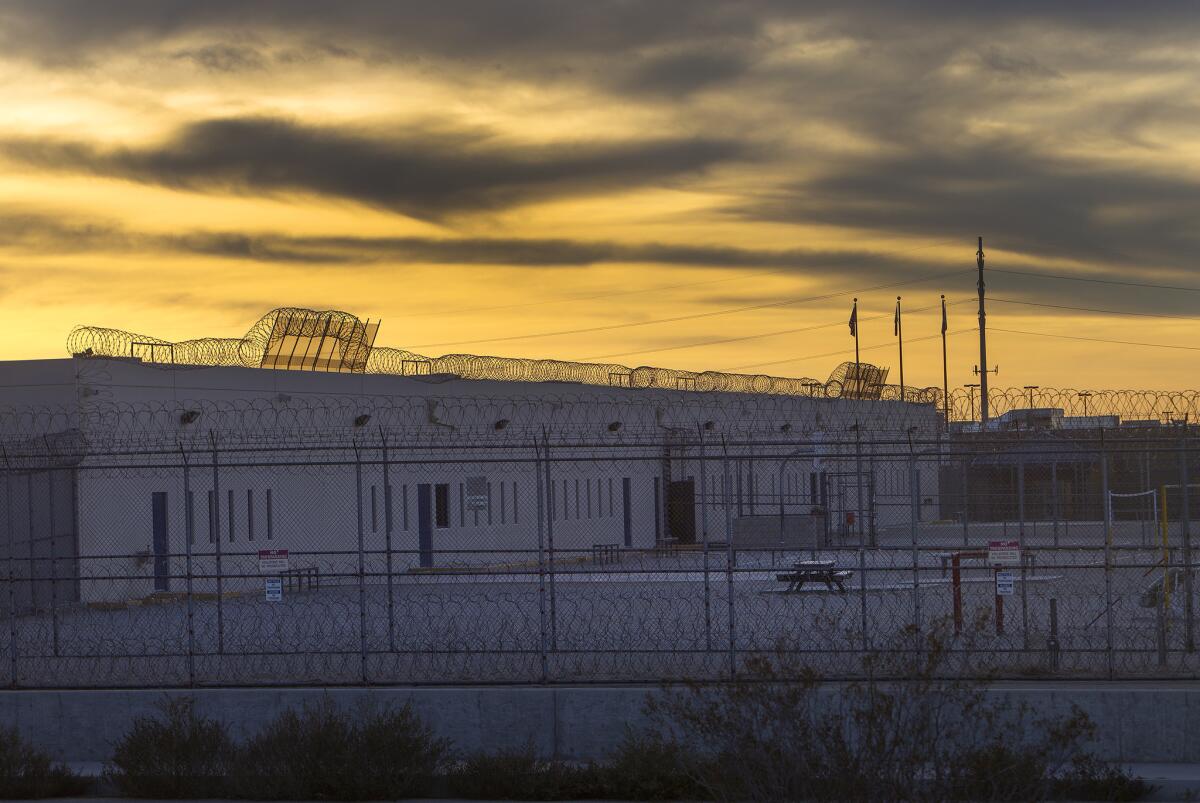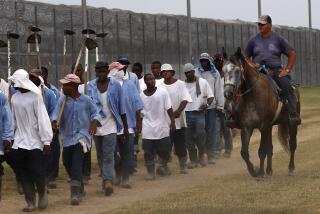Why 26 asylum-seekers in a California detention center have stopped eating

Inmates at the immigrant detention center in Adelanto, Calif., have launched a hunger strike to protest conditions there.
Reporting from Adelanto â Mohammed Zakir Hosain is so lightheaded he can barely walk. His lips are chapped. His tongue, which hasnât tasted food or water in nearly a week, is dry and swollen.
Since Nov. 4, Hosain and 25 other asylum-seekers held at an immigrant detention center in Adelanto have protested their incarceration here by refusing to eat.
The group -- which includes a man fleeing anti-gay laws in Ghana and others escaping religious and political persecution in Pakistan, Nepal and Bangladesh -- wants the U.S. Immigration and Customs Enforcement agency to release them from detention while their asylum cases are pending.
NEWSLETTER: Get the dayâs top headlines from Times Editor Davan Maharaj >>
âWe will not eat until we see our freedom,â the group wrote in a list of demands.
Questions about who qualifies for asylum and what that process should look like have been widely debated in recent years, as hundreds of thousands of Syrian war refugees have sought help in Europe and tens of thousands of minors fleeing violence in Central America have shown up at the southern U.S. border.
The hunger strike at Californiaâs largest immigrant detention center comes on the heels of similar strikes at other ICE facilities in Louisiana and Texas.
In each case, detainees have complained that they should be set free on their own recognizance or on reasonably priced bonds. Some have languished in detention for years while their cases are decided in immigration courts.
Hosain, 28, has been here for one year. A member of an opposition party in Bangladesh, he says he fled the country in 2014 after being beaten repeatedly by members of the party in power.
Hosain followed a well-traveled path for Asians and Africans seeking asylum in the U.S., flying first to South America and then making his way slowly north. He was detained for several weeks each in Panama and Mexico before he arrived at the San Ysidro border crossing and asked a U.S. Border Patrol agent for political asylum.
Hosain has family in New York, and ICE officials could have released him there with an order to appear in immigration court. But instead they sent him to Adelanto to wait his case out.
Under law, detainees who spend more than six months in detention must be given bond hearings before an immigration judge.
The judge in Hosainâs case set bond at $48,000, according to his attorney, Douglas Jalaie. The judge reduced bond to $25,000 after Jalaie appealed, but that was still too much for Hosain.
âWhere can we get this kind of money?â Hosain said in an interview Tuesday, his eyes bloodshot and his voice weak. âWe are not criminals. We just want protection.â
ICE and the immigration court system consider a variety of factors when deciding whether to release immigrants from detention, including their flight risk, their criminal history and whether or not they have U.S. ties.
Victoria Mena, a monitor with the group Community Initiatives for Visiting Immigrants in Confinement, which has been working with the hunger strikers at Adelanto, said she believes asylum-seekers are being kept in detention for long periods of time because ICE is under pressure to fill tens of thousands of detention beds each night per a 2009 congressional mandate.
âTheyâre refugees,â Mena said. âThey shouldnât have to buy their freedom.â
An ICE official who was not authorized to speak on the record said the 26 men at Adelanto have been isolated from the rest of the detention population and are being observed closely by medical staff.
The official said ICE agents have also met with the men to listen to their concerns.
According to the agencyâs protocol, detainees engaged in hunger strikes are weighed and their vital signs taken daily. In previous cases, federal judges have ordered the agency to force-feed striking detainees.
Another detainee participating in the hunger strike, Ibrahim Karim, said Tuesday that he is prepared to go as long as it takes without eating to win his freedom. He said that if that is denied, he is prepared to die.
âIâm ready to die here, no problem,â Karim said. âI will die here in Adelanto.â
A Ghana national who was born a Muslim, Karim, 33, said he converted to the Jehovahâs Witness faith several years ago. He said he fled his country after people in his predominately Muslim village attacked and threatened to kill him.
âThere is no freedoms in Africa,â he said.
He arrived in Panama after crossing the Atlantic Ocean as a stowaway on a cargo ship. It took him six months to reach the U.S. border.
His next asylum court date is Nov. 25. A week before that, he will get a chance to ask an immigration judge for a bond hearing.
Karim, who canât afford an attorney, is worried that he wonât be able to afford bond either. The minimum bond is typically about $1,500.
Another larger group of detainees at Adelanto had announced a hunger strike two weeks ago, but those detainees started eating early last week, according to ICE officials and detainees. According to a list of demands provided by those detainees, they were primarily protesting conditions at the detention center.
The Adelanto facility is run by a private contractor, Florida-based Geo Group. It was recently expanded by 650 beds despite protests from more than two dozen members of Congress over alleged medical neglect at the facility.
A letter sent to ICE by members of Congress in July highlighted nearly a dozen cases of supposed neglect, including the 2012 pneumonia death of a Mexican immigrant named Fernando Dominguez.
An inspection report that year by the Department of Homeland Security said that Dominguez âreceived an unacceptable level of medical careâ at Adelanto and that his death could have been prevented.
For more coverage of immigration news and issues, follow @katelinthicum.
ALSO:
Key question in immigration court fight: Is president enforcing deportation laws or changing them?
A surge in short-term rentals means no R&R for some Anaheim residents
Disneyâs Bob Iger hired by Chargers, Raiders to oversee Carson stadium project
More to Read
Sign up for Essential California
The most important California stories and recommendations in your inbox every morning.
You may occasionally receive promotional content from the Los Angeles Times.











